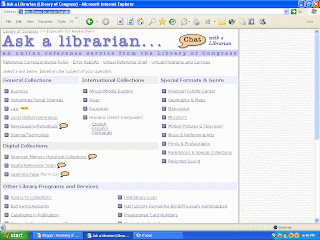I tend to look positively at certain aspects of American democracy and applaud them, remaining intolerant of the less commendable aspects of the erosion of civil liberties. Our access to information is a commendable aspect, one relatively unfettered by government interference (the Patriot Act hinders the pursuit of information after the fact, but not directly). This access to information, the first step in developing an informed citizenry, is the cornerstone of democracy. When the government invests heavily in this process, we must view it is a positive indication of a commitment to freedom, to justice, to the pursuit of making wise decisions based on accurate information. At least that is the way it is supposed to work.
Which is why I feel the Ask a Librarian service at the Library of Congress is a wonderful tool for this pursuit. You can get timely answers to any question you might have from some of the best reference librarians in the world. Granted, the Library of Congress can be a stodgy beast at times (they are really racing to catch up to the whole digitization trend after viewing it is as some sort of novelty for years), but their employees are professional, civic-minded and altogether knowledgeable about what resources exist.
Many universities and public libraries have this function as well, some sort of real-time assistance via a telephone call or chat room or email. So, the next time you have a question about law or government or finances or even a history question that has been puzzling you, drop the experts a line by clicking here.
